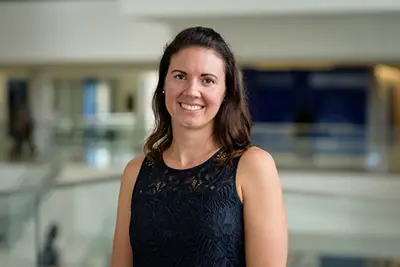Students Get Research and Public Health Experience Working with Residents
 Image by K. Webster
Image by K. Webster
01/25/2023
By Katharine Webster
When Jack Callahan, a public health major in the Honors College who was awarded a $4,000 Immersive Scholarship to get early research experience, saw an opportunity to help Lowell become an “age-friendly community,” he quickly applied.
Now a sophomore, Callahan is working alongside faculty and students in the university’s Center for Population Health as well as city officials, representatives of local nonprofits and other organizations and an advisory council of older residents to evaluate city services, policies, infrastructure, health care and social opportunities. The goal? To ensure that all the city’s residents have the resources they need to live long, healthy lives.
Callahan says the experience is great preparation for his future career.
“I want to work in community health, and this is the exact thing I want to do, working with public infrastructure to support the people who need it most,” he says.
Callahan is among more than two dozen students, both graduate and undergraduate, working on the project through the Center for Population Health, which includes faculty from health and social sciences. The center is co-directed by Nutritional Sciences Assoc. Prof. Sabrina Noel, Prof. Katherine Tucker and Luis Falcón, dean of the College of Fine Arts, Humanities and Social Sciences.
“I think it’s an incredible opportunity for students to see the application of what you learn in the classroom to a real-world experience that is going to directly impact the lives of residents, from start to finish,” says Noel, who is leading the age-friendly project.
“It’s more than just having knowledge; it’s professionalism, thinking about culture, thinking about the community as a whole and all the different factors beyond personal health behaviors that impact people.”
 Image by K. Webster
Image by K. Webster
Other key participants are city agencies, the Lowell Senior Center, the Cambodian Mutual Assistance Association, the Greater Lowell Health Alliance, D’Youville Life and Wellness Community and AgeSpan, among others.
“Our goal was to ensure that the project was community-led,” Noel says. “It was designed to ensure that the voices of older adults in the community are heard in every element of the project.”
The study is funded by a three-year, $300,000 grant from the Tufts Health Plan Foundation (now the Point 32 Health Foundation). Lowell is now part of a network of nearly 100 AARP age-friendly communities in Massachusetts.
Noel previously worked as the evaluator on the center’s age-friendly Lawrence project. She and Robin Toof, director of UML’s Center for Community Research and Engagement, recently won a $375,000 Massachusetts Healthy Aging Grant to help Lawrence craft an action plan to guide community health initiatives.
The age-friendly Lowell evaluation, like that in Lawrence, looks at social determinants of health across the lifespan that affect aging, such as outdoor spaces and buildings, transportation, health services, housing, safety, and social and employment opportunities, Noel says.
“Everything we’re doing impacts all individuals in the community, because we are all aging,” she says.
Where data already exists, the researchers are analyzing it; where it doesn’t, they’re filling in the gaps through surveys and focus groups in three languages – English, Khmer and Spanish – as well as interviews and direct observation.
For example, they recently finished evaluating all 82 public parks in Lowell, walking through them with members of the Action Group and systematically collecting data on the parks’ assets and limitations, Noel says.
 Image by K. Webster
Image by K. Webster
Brianna Harrington, an honors nursing major, was awarded a $5,000 Age-Friendly Scholarship to work on the project throughout her junior year. She is evaluating access to healthy food by building on the comprehensive food assessment conducted by Mill City Grows, an urban farming nonprofit in Lowell, to focus specifically on older adults.
She has also been analyzing the center’s comprehensive surveys to better understand residents’ access to and use of a range of resources and services that support physical and mental health – while gathering their ideas for improvements. This spring, she will be conducting in-depth interviews with older adults as well, she says.
Harrington, who plans to work in geriatrics or acute care, says she is learning a tremendous amount that will help her in her future career.
“Public health and prevention and not having an ageist attitude are big aspects of taking care of someone,” she says. “I’m learning to develop relationships with older adults in the community.”
In addition to research experience, the students also get personalized mentoring from Noel and Physical Therapy and Kinesiology Asst. Prof. David Cornell.
They hold a research meeting and professional development seminar every Friday for the entire group, walking the students through applying for jobs, scholarships and graduate programs. They also assign teams of graduate and undergraduate students to read, analyze and present journal articles to the group.
Master of Public Health student Kyle Fahey ’22 has been working in the Center for Population Health since he was a junior nutritional sciences major. Although he once thought of becoming a dietitian, the age-friendly initiative motivated him to pursue a doctoral degree in epidemiology instead, so he can make changes that will affect entire populations. He hopes to be accepted to the doctoral program this year.
“These projects have opened my eyes to the collaborations necessary to help people on a larger scale,” he says. “It’s been great being able to learn about the priorities and values of the community … and to know that the work we are all doing is directly, positively impacting each of their lives.”




